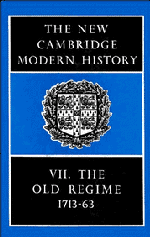Book contents
- Frontmatter
- CHAPTER I INTRODUCTORY SUMMARY
- CHAPTER II THE GROWTH OF OVERSEAS COMMERCE AND EUROPEAN MANUFACTURE
- CHAPTER III THE SOCIAL CLASSES AND THE FOUNDATIONS OF THE STATES
- CHAPTER IV THE VISUAL ARTS AND IMAGINATIVE LITERATURE
- CHAPTER V THE ENLIGHTENMENT
- CHAPTER VI RELIGION
- CHAPTER VII MONARCHY AND ADMINISTRATION
- CHAPTER VIII THE ARMED FORCES AND THE ART OF WAR
- CHAPTER IX INTERNATIONAL RELATIONS
- CHAPTER X THE DECLINE OF DIVINE-RIGHT MONARCHY IN FRANCE
- CHAPTER XI ENGLAND
- CHAPTER XII THE WESTERN MEDITERRANEAN AND ITALY
- CHAPTER XIII THE ORGANISATION AND RISE OF PRUSSIA
- CHAPTER XIV RUSSIA
- CHAPTER XV SCANDINAVIA AND THE BALTIC
- CHAPTER XVI POLAND UNDER THE SAXON KINGS
- CHAPTER XVII THE HABSBURG DOMINIONS
- CHAPTER XVIII THE WAR OF THE AUSTRIAN SUCCESSION
- CHAPTER XIX THE DIPLOMATIC REVOLUTION
- CHAPTER XX THE SEVEN YEARS WAR
- CHAPTER XXI THE DEVELOPMENT OF THE AMERICAN COMMUNITIES
- CHAPTER XXII RIVALRIES IN AMERICA
- CHAPTER XXIII RIVALRIES IN INDIA
- CHAPTER XXIV ECONOMIC RELATIONS IN AFRICA AND THE FAR EAST
- References
CHAPTER VI - RELIGION
Published online by Cambridge University Press: 28 March 2008
- Frontmatter
- CHAPTER I INTRODUCTORY SUMMARY
- CHAPTER II THE GROWTH OF OVERSEAS COMMERCE AND EUROPEAN MANUFACTURE
- CHAPTER III THE SOCIAL CLASSES AND THE FOUNDATIONS OF THE STATES
- CHAPTER IV THE VISUAL ARTS AND IMAGINATIVE LITERATURE
- CHAPTER V THE ENLIGHTENMENT
- CHAPTER VI RELIGION
- CHAPTER VII MONARCHY AND ADMINISTRATION
- CHAPTER VIII THE ARMED FORCES AND THE ART OF WAR
- CHAPTER IX INTERNATIONAL RELATIONS
- CHAPTER X THE DECLINE OF DIVINE-RIGHT MONARCHY IN FRANCE
- CHAPTER XI ENGLAND
- CHAPTER XII THE WESTERN MEDITERRANEAN AND ITALY
- CHAPTER XIII THE ORGANISATION AND RISE OF PRUSSIA
- CHAPTER XIV RUSSIA
- CHAPTER XV SCANDINAVIA AND THE BALTIC
- CHAPTER XVI POLAND UNDER THE SAXON KINGS
- CHAPTER XVII THE HABSBURG DOMINIONS
- CHAPTER XVIII THE WAR OF THE AUSTRIAN SUCCESSION
- CHAPTER XIX THE DIPLOMATIC REVOLUTION
- CHAPTER XX THE SEVEN YEARS WAR
- CHAPTER XXI THE DEVELOPMENT OF THE AMERICAN COMMUNITIES
- CHAPTER XXII RIVALRIES IN AMERICA
- CHAPTER XXIII RIVALRIES IN INDIA
- CHAPTER XXIV ECONOMIC RELATIONS IN AFRICA AND THE FAR EAST
- References
Summary
The War of the Spanish Succession and the Peace of 1713 showed how negligible in the common political concerns of Europe the Papacy had become. In Sicily and Sardinia territories which the popes had long claimed as their fiefs were disposed of without reference to Rome. The Treaty of Utrecht registered a great increase in the power of Britain, head of the Protestant interest. Every growth in the strength of Prussia meant extra weight on the Protestant side. The extinction of the Spanish Habsburgs was in its political consequences unfavourable to the Holy See. The Most Catholic King, the Most Christian King, the Holy Roman Emperor, even the Most Faithful King of Portugal, decorated with this title only in 1748, seemed to have but cupboard love for their Church. They were all interested that no one should be made pope who might be too independent, or under hostile influence.
In these circumstances, another Gregory VII, or another Innocent III, was hardly to be expected. Clement XI (1700–21) was ‘timorous and undecided’. Innocent XIII (1721–4) owed his election partly to his great age, as the princes were determined that the long pontificate of Clement XI should not be repeated by another begun by a young man. Old, ill, and difficult of access, so far from emulating his thirteenth-century namesake, he maintained only a respectable level of diplomatic competence. The pious Orsini, the Dominican Benedict XIII (1724–30), was an austere and exacting ritualist, but administratively gullible and incompetent. Clement XII (1730–40), a Corsini, an experienced curial administrator and good with money, had first to undo much that Benedict XIII had done, whom he as a cardinal had steadily opposed; or that Benedict XIII had permitted to be done, by corrupt favourites like the cardinal Coscia, who paid for his misdeeds until the next conclave with seven years in the Castel Sant' Angelo.
- Type
- Chapter
- Information
- The New Cambridge Modern History , pp. 113 - 140Publisher: Cambridge University PressPrint publication year: 1957



